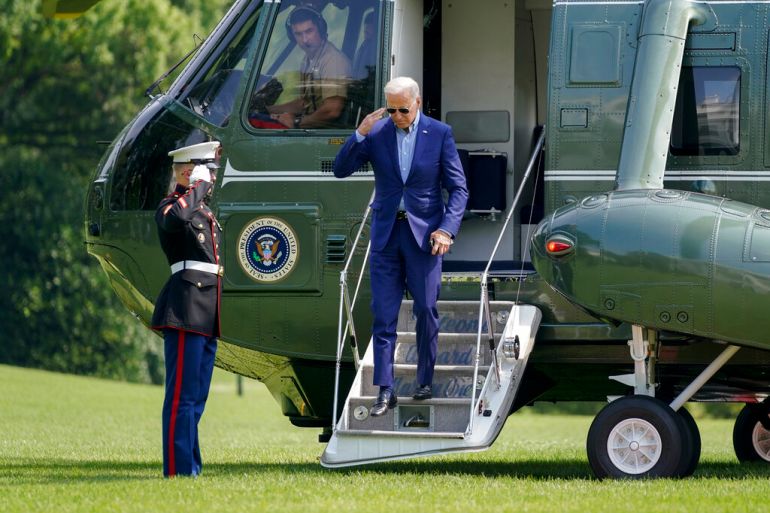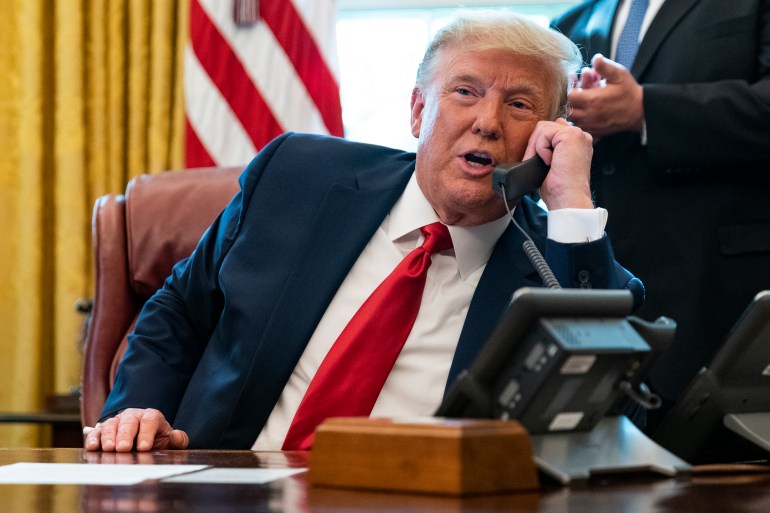A year in, Biden’s Middle East policy brings little change
Despite a change in style, the Biden administration has largely continued Donald Trump’s policies in the key region, analysts say.

Washington, DC – Early in his presidency, Joe Biden promised to break with his predecessor Donald Trump by placing “democratic values” and “diplomatic leadership” at the centre of United States foreign policy.
But as 2021 comes to a close, Biden’s first months in office have been marked by what experts say is a passive Middle East policy focused more on managing the status quo than resolving major conflicts.
Keep reading
list of 3 itemsBiden signs enormous US military budget into law
Biden to hold call with Russia’s Putin on Thursday
A senior Biden administration official, speaking on condition of anonymity earlier this month, appeared to acknowledge this point, telling reporters that Washington was not trying to “transform” the region.
“We’re not trying to achieve the unachievable; we’re not trying to transform the Middle East,” the official said on December 17. “We’re focused on the interests that impact Americans and our national security, and the national security of our friends.”
Meanwhile, some of Biden’s top initiatives in the region – reviving the Iran nuclear deal and ending the war in Yemen – have not produced results yet, as the Democratic president has largely focused on pressing domestic issues, from COVID-19 to a massive infrastructure bill.
With the pandemic still in full swing, a foreign policy pivot to competition with China, growing concern over Russia’s posture in Eastern Europe and the fallout from the chaotic US withdrawal from Afghanistan, analysts say Biden seems to lack the “bandwidth” and the will to pursue transformative policies in the Middle East.
“I don’t think there’s a broader Middle East policy right now. What there is, is managing the mess they inherited,” said James Zogby, president of the Arab American Institute (AAI), a Washington, DC-based think-tank.
Continuation of Trump policies?
Washington began playing an active role in the Middle East after World War II, pursing policies focused on safeguarding the free flow of the region’s oil resources, building alliances with the Gulf monarchies, countering communism and protecting Israel.
The approach shifted to containing Iran after the 1979 Islamic Revolution, and in 2003, US troops invaded Iraq under then-President George W Bush, expanding Washington’s military footprint in the region. When Trump came to office in 2017, he forcefully pursued policies he considered to be in US interests, strengthening ties with the Gulf and Israel.
Some rights advocates had hoped Biden, with his promise to prioritise human rights, would not only break with Trump, but with the decades-long US policy in the region. While the administration is still early into its tenure, Middle East observers say hopes are slowly beginning to fade that the president will make good on his pledge as it pertains to the region.
Kristian Coates Ulrichsen, a Middle East fellow at Rice University’s Baker Institute for Public Policy, said with the Iran nuclear deal “still up in the air” and the war in Yemen continuing to rage, Biden’s approach to the Middle East is “very similar” to that of Trump.
“The deeper down, the substance, is not as different as one might have imagined. So, it’s more one of style,” Ulrichsen told Al Jazeera.
Support for Israel
Further, analysts also point out that Biden has kept in place some of Trump’s most controversial policies in place – especially on Israel, a longtime US ally in the region.
Biden administration officials vehemently reject comparisons to policies championed by Trump, a staunch defender of the Israeli government who was accused of undermining US values and eroding diplomacy with his tweets and bombastic rhetoric.
Yet Biden decided to keep the US embassy in Jerusalem, cementing the altered status quo established by the former administration, and his White House has not reversed Trump’s recognition of Israel’s claim to sovereignty over the occupied Syrian Golan Heights.
The current administration also fully embraced Trump’s normalisation efforts between Israel and Arab states. The United Arab Emirates, Bahrain, Morocco and Sudan agreed to establish diplomatic ties with Israel last year as part of the Trump-brokered “Abraham Accords”.

“We will encourage more countries to follow the lead of the Emirates, Bahrain and Morocco,” US Secretary of State Antony Blinken said in September. “We want to widen the circle of peaceful diplomacy because it’s in the interests of countries across the region and around the world for Israel to be treated like any other country.”
Indeed, Israel’s security remains the top priority for the Biden administration, which faced widespread pressure in May to publicly call for an end to Israel’s bombardment of the Gaza Strip, saying instead it wanted to work behind the scenes to secure a ceasefire.
“A basic, fundamental principle, to President Biden – as he often says: If Israel did not exist, we would have to invent it. And the security of Israel is first and foremost in his mind and ours,” the senior Biden administration official told reporters this month.
Biden has restored some humanitarian aid to Palestinians that had been cut by Trump, and his administration has said it supports a “two-state solution” to resolving the conflict.
But the US president has not fulfilled his campaign promise of opening a consulate for Palestinian affairs in East Jerusalem amid overt Israeli opposition to the move, and Biden and his top aides have mostly refrained from criticising Israel publicly – including on documented human rights abuses against Palestinians.
Instead, they often insert mild opposition to Israeli policies – including settlement expansion and efforts to forcibly remove Palestinian families from their homes in East Jerusalem – in statements opposing “unilateral steps” from both sides that the administration says inflame tensions.
Zogby said Biden’s approach to the Israel-Palestine issue illustrates how “playing small ball doesn’t add up” in the Middle East policy.
“Being nice-nice with the Israelis and having a few meetings with Abu Mazen does not change the dynamic that’s unfolding on the ground,” he said, using a kunya for Palestinian President Mahmoud Abbas.
US-Saudi Arabia relations
Meanwhile, Washington’s warm relationships with many authoritarian Arab governments has been a growing point of contention, with Democrats becoming more vocal in recent years in their criticism of US-Saudi Arabia ties in particular.
Their critiques reached a fever pitch following the murder of journalist Jamal Khashoggi and as the Saudi-led military offensive in Yemen dragged on, leading to what the United Nations has dubbed the world’s worst humanitarian crisis.
Trump had forged cosy ties with the rulers of the kingdom, which he visited on his first foreign trip as president in 2017. And when campaigning ended and governing began, Biden – who in 2019 promised to make Saudi Arabia a “pariah” – did not push for a drastic change in the alliance.
Biden announced an end to the US support for Saudi-led “offensive operations” in Yemen, but he stressed that his administration was not abandoning the kingdom. “We’re going to continue to support and help Saudi Arabia defend its sovereignty and its territorial integrity and its people,” the US president said in February.
His aides have also repeatedly lauded Washington’s ties with Riyadh, and the US administration greenlit a $650m sale of air-to-air missiles to Saudi Arabia as well as a $500m helicopter maintenance deal.
Saudi Arabia intervened in Yemen in 2015 to push back the country’s Houthi rebels, who had taken over most of the country, including the capital Sanaa, and to restore the Gulf-backed government of President Abd Rabbu Mansour Hadi.
Biden appointed seasoned US diplomat Tim Lenderking as a special envoy for Yemen to focus on ending the war, but his diplomatic efforts and numerous trips to the region have yet to yield positive results. The Houthis have rejected a US-backed Saudi proposal for a ceasefire, insisting the Saudi-led air and sea blockade on Yemen must be lifted before the fighting can end.
Iran, Egypt policies
Another key issue for the Biden administration in its first year has been efforts to revive the Iran nuclear deal.
Trump withdrew the US from the multilateral agreement in 2018 and started a “maximum pressure” campaign of sanctions against Iran, which in turn started escalating its nuclear programme. Although the Biden administration started indirect talks with Iran to restore the pact, it has continued to enforce Trump’s sanction regime and added its own sanctions.
“This is an issue where there has been more continuity than change between the two administrations,” Ulrichsen said.
He added that easing some sanctions early on could have been a “signal” to the Iranians that the new administration was committed to “changing the dynamic within this negotiation”, especially before hardline Iranian President Ibrahim Raisi was elected in June.
Biden’s aides stress that – unlike Trump who alienated US partners by leaving the deal – they are pursuing a multilateral approach to Iran, cooperating with European allies as well as competitors Russia and China, to push Tehran back into compliance with the nuclear pact.

On Egypt policy, while Biden shortly before the 2020 election promised “no more blank cheques to Trump’s ‘favourite dictator'” in reference to President Abdel Fattah el-Sisi, the administration has been praising Cairo’s role in the region and pushing to strengthen the US-Egypt partnership.
Rights groups accuse el-Sisi’s government of jailing thousands of dissidents and outlawing virtually all forms of political opposition since coming to power in a 2013 coup, but the Egyptian president denies holding political detainees and says that his government is fighting “terrorism”.
Biden withheld $130m out of $1.3bn in annual aid to Egypt over human rights concerns, but Ulrichsen said the move was more of a symbolic gesture than a consequential policy shift.
“It’s probably not going to send a strong message to the rest of the region,” he told Al Jazeera. “It’s probably a signal that they’re doing something for the sake of having to be seen to be doing something.”